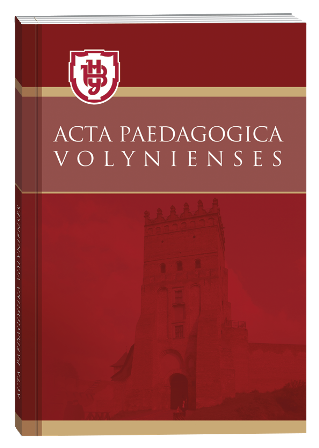USING ANTICIPATION IN WORKING WITH CHILDREN WITH SPECIAL EDUCATIONAL NEEDS
DOI:
https://doi.org/10.32782/apv/2023.2.17Keywords:
probabilistic prediction, children with special educational needs, speech, experience, memory, functionsAbstract
The purpose of the article is to analyze the possibilities of using probabilistic forecasting operations in working with children with special educational needs. The analysis of scientific and practical sources proved that until now, the issue of using the ways of probable forecasting in working with children with special educational needs in correctional pedagogy and special psychology has not been considered enough. Probabilistic prediction in speech is actions or operations when receiving information, which consist in predicting words or phrases. It manifests itself at all levels of speech − from the composition to the text, and the broader the context and the more complex the structure of the entire message, the more perception depends on the probabilistic assessment of the entire message. The author examines the main types and functions of probable forecasting (anticipation), substantiates the appropriateness and effectiveness of using its varieties at various stages of educational activity. The issue of the application of probabilistic forecasting operations in relation to speech activity has not been studied much. However, the available material gives an idea of the fundamental role and concrete implementation of this phenomenon in language practice. The practice of working with children who have speech disorders convinces us of the importance of correction of development, education and upbringing having an anticipatory, probably prognostic character. The author believes that it should not aim to consolidate and improve what is already there, what the child has already achieved, but to actively shape what should be achieved by him in the near future in accordance with the laws and requirements of age development and the formation of personal individuality. Studying the main functions of probabilistic forecasting, the specifics of its application, substantiating the appropriateness and effectiveness of its varieties at various stages of the educational activity of preschool children will enable teachers to widely apply it in their work.
References
Бродовська В.Й. Тлумачний словник психологічних термінів в українській мові / В.Й. Бродовська, І.П. Патрик, В.Я. Яблонко. 2-ге вид. К. : Професіонал, 2005. 222 с.
Брушневська І.М. Формування ймовірного прогнозування як психолого-педагогічна проблема. Актуальні питання корекційної освіти (педагогічні науки). Кам’янець-Подільський : Медобори-2006, 2015. № 5. С. 21–32.
Брушневська І.М. Діагностика сформованості операцій ймовірного прогнозування у дітей п’ятого року життя. Молодь і ринок. 2015. № 7 (126). С. 135–139.
Спеціальна педагогіка [понятійно-термінолог. словник] / за ред. акад. В.І. Бондаря. Луганськ : Альма-матер, 2003. 436 с.
Тищенко В.В. Ймовірне прогнозування у мовленнєвій діяльності розумово відсталих дошкільників. Дефектологія. 1998. № 3. С. 2–6.







